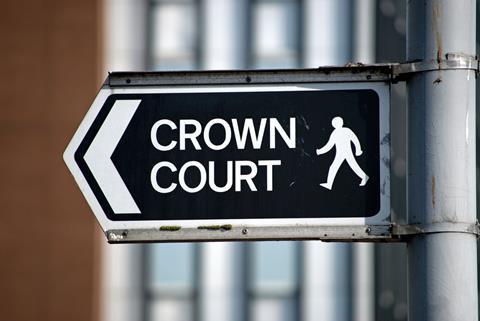The Crown court backlog has reached ‘unacceptable’ levels with 76,957 outstanding cases – a 25-year high according to the Criminal Bar Association.
The latest figures, covering January to March 2025, show an 11% increase on the same period last year (69,021), and an increase from 74,592 since December. At this rate, the backlog will reach 100,000 cases by autumn next year, the data suggests.
The median age of open cases and the number of cases open for a year or more both increased compared with the previous quarter. According to the data, 18,093 cases have been open for a year or more. The open caseload in magistrates’ courts also increased to 310,304.
Mary Prior KC, CBA chair, said the figures showed an ‘emergency’ within the Crown court, while minister for courts and legal services Sarah Sackman KC MP said ‘only radical reform’ would help curtail the crisis.
Former judicial chief for criminal justice Sir Brian Leveson was asked last year to conduct an independent review of the criminal courts and explore options to ‘speed up justice’. Leveson’s review and recommendations are expected to be published soon, though no date has been given. It will be followed up with findings on court efficiency in autumn this year.
Prior said: ‘Victims of serious crimes want their cases dealt with in months, not years. People falsely accused of crimes want the same. Both want the nightmare to end.

Read more
She added: ‘We urge the government to open up the closed Crown courtrooms across the country and allow these cases to be heard. Whatever the radical reforms suggested in ongoing reviews, implementation will take at least another year. The traumatised people in the long queue for justice may well have walked away by then, unheard and unseen.
‘When all Crown courts are open and functioning, the judiciary, criminal barristers and court staff can ensure that trials take place. The government can find money for things when it needs to; it finds money for emergencies. This is an emergency.’
Sackman said: 'Despite the hard work of people across the criminal justice system, the situation in our Crown court is reaching breaking point. We inherited a courts crisis with an ever-growing backlog which, at its current rate of increase, will hit 100,000 before 2028.
‘It is simply unacceptable that any victim has to wait years to see justice done, and it is clear the status quo is not working. Only radical reform can deliver swifter justice for victims and that is why we asked Sir Brian Leveson to make recommendations for once-in-a-generation change, to be published in the coming weeks.’
Law Society president Richard Atkinson said: ‘The independent review of the criminal courts and independent sentencing review must be backed with sufficient investment, as must the legal aid system which underpins them, for the government to meet its responsibility to support our criminal justice system for the common good.
‘A fair and functioning justice system is a key reason why England and Wales is seen around the world as a jurisdiction of choice for people to resolve their disputes. Assuring the quality of our criminal justice system will help to ensure that the UK maintains its reputation as a global legal centre, which is crucial to the country’s economy.’
This article is now closed for comment.



























23 Readers' comments